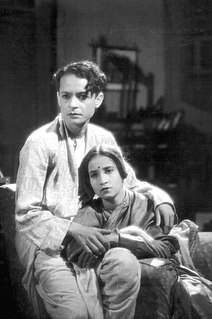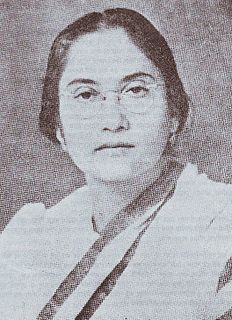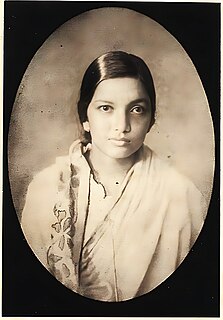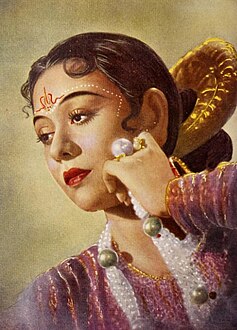
Manabendra Nath Roy was an Indian revolutionary, radical activist and political theorist, as well as a noted philosopher in the 20th century. Roy was the founder of the Mexican Communist Party and the Communist Party of India.
Bengali Brahmos are those who adhere to Brahmoism, the philosophy of Brahmo Samaj which was founded by Raja Rammohan Roy. A recent publication describes the disproportionate influence of Brahmos on India's development post-19th Century as unparalleled in recent times.

New Theatres is an Indian film studio. It was formed in Calcutta by producer B. N. Sircar. It was formed on 10 February 1931. Motto of this company was– Jivatang Jyotiretu Chhayam. Sircar preferred to function

Pramathesh Chandra Barua was an Indian actor, director, and screenwriter of Indian films in the pre-independence era, born in Gauripur, Dhubri, Assam.

Kanan Devi was an Indian actress and singer. She was among the early singing stars of Indian cinema, and is credited popularly as the first star of Bengali cinema. Her singing style, usually in rapid tempo, was used instrumentally in some of the biggest hits of New Theatres, Kolkata.

The Bardhaman Raj, also known as Burdwan Raj, was a zamindari Raja estate that flourished from about 1657 to 1955 in the Indian state of West Bengal. Maharaja Sangam Rai Kapoor, a Khatri from Kotli, Punjab, who was the first member of the family to settle in Bardhaman, was the original founder of the house of Bardhaman, whereas his grandson Abu Rai, during whose time the zamindari started flourishing, is considered to be the patriarch of the Bardhaman Raj family.

Leela Roy née Nag, was a radical leftist Indian woman politician and reformer, and a close associate of Netaji Subhash Chandra Bose. She was born in Goalpara, Assam to Girish Chandra Naag, who was a deputy magistrate, and her mother was Kunjalata Naag. She was the first female student of Dhaka University.
Mira Datta Gupta was a freedom fighter, social worker, educationist, politician and activist on women's issues in Calcutta, India. She was a Member of the Legislative Assembly (MLA) in Bengal and then West Bengal for twenty years from 1937 to 1957, firstly representing Women's constituency from 1937 to 1952, and then Bhowanipore from 1952 to 1957. She was the first MLA from Bhowanipore.

Nitin Bose was an Indian film director, cinematographer and screenwriter of the nation's film industry. He was born in Calcutta and died in the same city. In the 1930s and early 1940s, he worked with New Theatres, who made bilingual movies: in both Bengali and Hindi. Later, he moved to Bombay and directed under the banners of Bombay Talkies and Filmistan.

Shanti Devi, known as Lugdi Devi in her alleged past life, was an Indian woman who claimed to remember her previous life, and became the subject of reincarnation research. A commission set up by the Indian political leader Mahatma Gandhi supported her claim, while another report by researcher Bal Chand Nahata disputed it. Subsequently, several other researchers interviewed her, and published articles and books about her.

Kalpana Datta, also Kalpana Joshi, was an Indian independence movement activist and a member of the armed independence movement led by Surya Sen, which carried out the Chittagong armoury raid in 1930. Later she joined the Communist Party of India and married Puran Chand Joshi, then General Secretary of the Communist Party of India in 1943.

Birendranath Sircar was an Indian film producer and the founder of New Theatres Calcutta. He made Bengali-language films that were noted for introducing many film directors who later became famous. He was awarded the Dada Saheb Phalke Award in 1970 and the third highest civilian award in India, the Padma Bhushan, in 1972.

Sadhana Bose was an Indian actress and a dancer. She acted in movies like Meenakshi, where she played the lead.
Sir Uday Chand Mahtab KCIE the Maharajadhiraja Bahadur of Bardhaman Raj, K.C.I.E., was the last ruler of Burdwan Raj, who ruled from 1941 until 1955, when the zamindari system was abolished in India.

Carol Hughes was an American actress. She is best remembered for her leading roles opposite Gene Autry and Roy Rogers, and for her role as Dale Arden in Flash Gordon Conquers the Universe (1940).

Dhiraj Bhattacharya was an actor of Bengali and Hindi cinema who began in silent films. He was also a theater personality and writer.
Karen DeWolf (1904–1989), sometimes known as Gypsy Wells, was an American screenwriter and novelist credited on over 50 films during her 20+ years in Hollywood. She's best known for her work on Columbia's Blondie films, in addition to movies like Nine Girls and Johnny Allegro. She also wrote a book, Take the Laughter, in 1940.
Olivette "Olive" Cooper was a prolific American screenwriter known for movies like Cocoanut Grove, Bandit King of Texas, and Three Little Sisters. She wrote many of the screenplays for Roy Rogers and Gene Autry vehicles.

Jan Duggan was an American film and stage actress.













